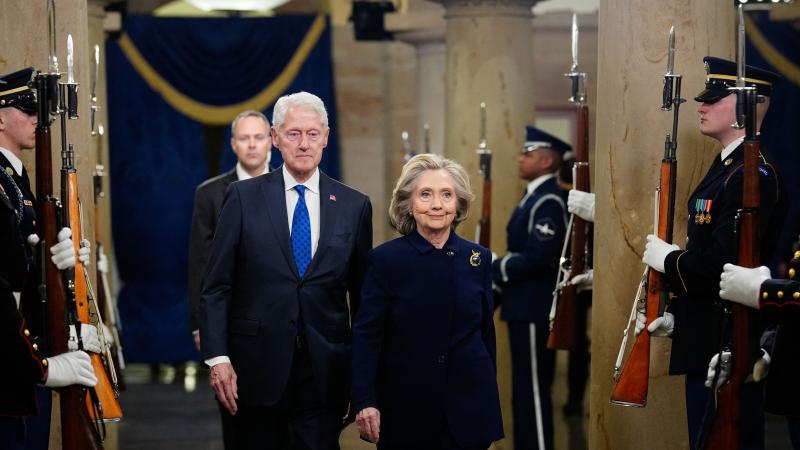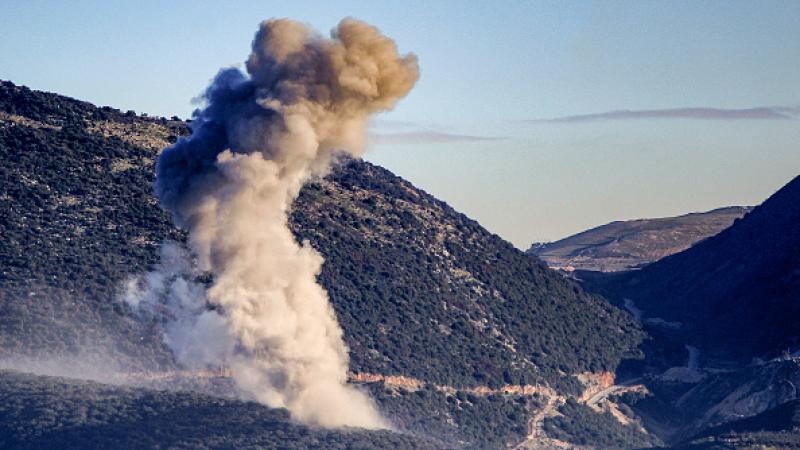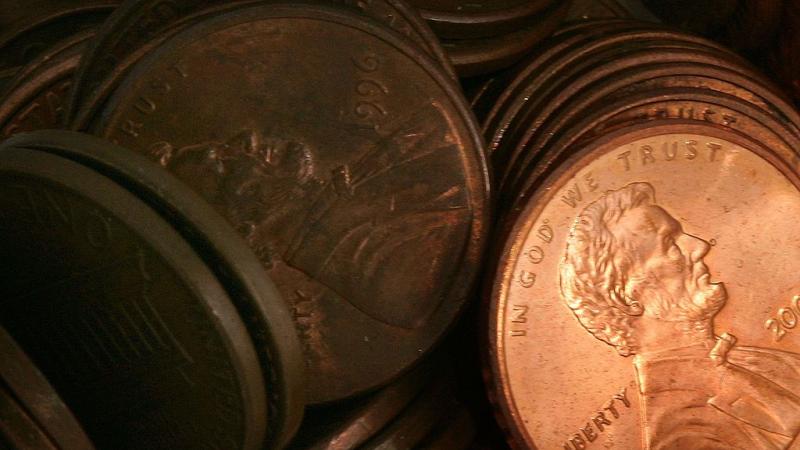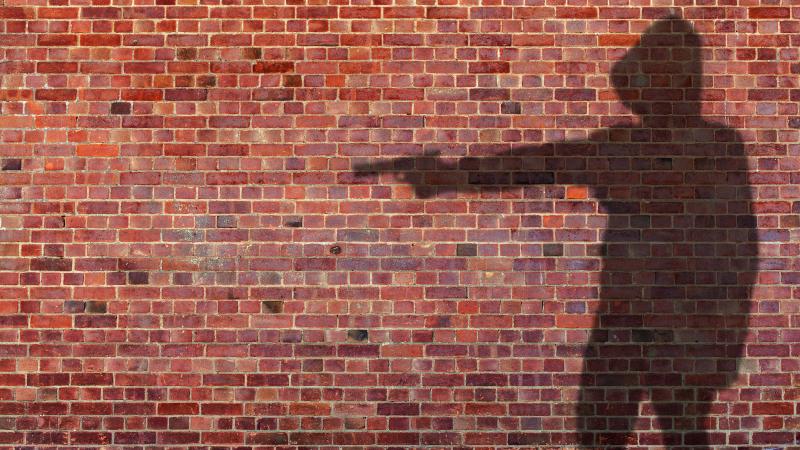Cop who fatally shot J6 protestor has lengthy disciplinary record that includes gun incidents
The issues in officer Michael Byrd's background included a failed shotgun qualification test, a failed FBI background check, a suspension for a lost weapon and referral to prosecutors for firing his gun at a stolen car.
The Capitol Police officer who fatally shot Ashli Babbitt during the Jan. 6 riots and then was promoted has a lengthy internal affairs and disciplinary record that includes firearm-related incidents, a sweeping congressional investigation has found.
The issues in Captain Michael Byrd's background included a failed shotgun qualification test, a failed FBI background check for a weapon's purchase, a 33-day suspension for a lost weapon and referral to Maryland state prosecutors for firing his gun at a stolen car fleeing his neighborhood, according to congressional and police documents obtained by Just the News.
Byrd’s record was uncovered during a larger House Administration Oversight Subcommittee investigation into the Capitol Police disciplinary process and was chronicled in a letter Rep. Barry Loudermilk, R-Ga., the panel's chairman, sent Wednesday to the department's chief, Thomas Manger, in which the lawmaker expressed concerns about the officer’s promotion to captain.
“This Subcommittee is dedicated to ensuring USCP has autonomy from political pressures so it can make operational and personnel decisions,” Loudermilk wrote in the letter. “However, based on the information obtained by the Subcommittee regarding USCP’s handling of Captain Byrd following January 6, 2021, and his significant disciplinary history, I have concerns about USCP’s decision to promote him to the rank of Captain.”
You can read the letter below: List of incidents:
The incidents described in Loudermilk's letter are corroborated by congressional records and police reports that date as early as 2004 including:
- A 2004 incident where Byrd, who was off duty, fired his weapon at a stolen vehicle as it was fleeing his residential neighborhood;
- A 2015 "conduct unbecoming an officer" complaint filed by a fellow officer after Byrd, again off duty, confronted him while the officer was working at a high school football game in an incident with racial overtones;
- A 33-day suspension in 2019 after Byrd left his service weapon unattended in a public Capitol Hill bathroom;
- A failure to pass a routine background check shortly after Jan. 6 when attempting to purchase a shotgun for home protection, after the USCP worked to provide Byrd a department-issued shotgun instead, he failed the training; and
- Three further referrals to the Capitol Police Office of Professional Responsibility for which records are reportedly missing.
Mark Schamel, the lawyer representing Byrd, did not respond several requests for comment. The U.S. Capitol Police also did not return several inquiries from Just the News.
"I showed utmost courage"
In his only interview to date, Byrd told NBC News' Lester Holt about his experience on Jan. 6 and defended the decisions that he made that day, including to use his firearm against Ashli Babbitt, a pro-Trump protestor who had entered the Capitol.
"I believe I showed utmost courage on January 6, and it's time for me to do that now," Byrd said when he was asked why he decided to come forward publicly.
He told Holt that he was "very afraid" that day as protestors threatened to climb through the barricades blocking the doors into the House chambers while he was simultaneously hearing reports from around the Capitol of "breaches of different barricaded areas, officers being overrun, [and] officers being downed."
Ultimately, Byrd defended his choice to shoot an unarmed Ashli Babbitt, saying that in his assessment, she was "posing a threat" to the members of the House he was tasked with protecting.
"I had been yelling and screaming as loud as I was: please stop! Get back! Get back! Stop!" Byrd said. "We had weapons drawn," he recounted. "She was posing a threat to [the] United States House of Representatives."
"Lawful and within Department policy."
"I can only control my reaction, my training, my level of expertise," he said when asked why he fired his weapon that day while other officers in similar situations did not.
"I do my job for Republican, for Democrat, for white, for black," Byrd said, saying that he would have done the same whether it was members of the House or then-President Trump himself, to dispel accusations of political bias.
An internal USCP investigation completed in August 2021 determined that then-Lieutenant Byrd's conduct was "lawful and within Department policy." As a result, the department concluded that Byrd would not face any internal discipline for the officer involved shooting.
"[An] officer may use deadly force only when the officer reasonably believes that action is in the defense of human life, including the officer’s own life, or in the defense of any person in immediate danger of serious physical injury," USCP policy says.
"The actions of the officer in this case potentially saved Members and staff from serious injury and possible death from a large crowd of rioters who forced their way into the U.S. Capitol and to the House Chamber where Members and staff were steps away," USCP determined, concluding that Byrd's actions were justified.
By 2023, Byrd was promoted to the rank of captain by Capitol Police leadership.
Loudermilk is specifically concerned about Byrd’s promotion because of his lengthy disciplinary history, which includes at least two firearm incidents and one confrontation with another officer while off duty.
In 2004 — in the earliest event uncovered by Loudermilk’s investigation — then-Sergeant Byrd attempted to halt a car theft while he was off duty by brandishing his gun and firing two shots at a stolen vehicle in the middle of a suburban neighborhood, according to a Capitol Police Internal Affairs report reviewed by Just the News.
When explaining the incident to investigators, Byrd claimed that he fired his weapon at the oncoming vehicle as it tried to strike him. But, when the vehicle was found officers located one bullet hole in the rear of the vehicle that entered from behind, contradicting Byrd’s account, according to Loudermilk’s letter.
The detective investigating the incident concluded that Byrd exhibited bad judgement, intervening himself while off duty and discharging his weapon in an irresponsible manner.
“Just like I explained to [Byrd], when he saw what he saw outside of the window, I understand him being an officer, but it’s a stolen vehicle and it’s like call the police,” the detective is quoted as saying in the report.
The detective referred the case to the state’s attorney office as required by police policy. Byrd faced charges of “First Degree Assault" for firing two rounds into vehicles that attempted to assault him, according to an internal affairs report reviewed by Just the News.
The state prosecutor ultimately decided not to pursue charges but concluded Byrd exhibited “bad judgement,” according the internal affairs report. The Capitol Police Office of Professional Responsibility found that Byrd’s conduct was unbecoming and suspended him for seven days without pay, according to Loudermilk.
Byrd remained adamant that his actions were justified. He told investigators that he did not believe he had used his weapon in “a careless or imprudent manner” and denied any wrongdoing at all.
“[If] the incident occurred again he would not do anything differently,” the report summarizes. Byrd appealed OPR’s findings of misconduct to a Disciplinary Review Board, which ultimately overturned the findings and punishment.
Series of firearms-related incidents
Loudermilk’s letter raised serious concerns about the entire episode, including Byrd’s account to police that he fired at a vehicle trying to strike him when the evidence fellow officers found at the scene indicated he shot at the vehicle after it had already passed him and no longer posed a threat.
“OPR noted that ‘based on the location of the shell casings and the angle that Sergeant Byrd alleged he discharged his service weapon,’ Byrd’s testimony that he fired at the vans as they attempted to hit him is ‘inaccurate,’” Loudermilk wrote. “OPR concluded that the evidence suggests Byrd ‘discharged his service weapon at the vans after they passed him by,’” the letter added.
In 2015, Byrd again found himself the subject of an official complaint. A Montgomery County, Maryland, police officer filed a complaint against Byrd with the USCP after an alleged confrontation with him at a local high school football game.
Like the stolen car incident, Byrd was off duty when he confronted the Maryland officer, who was working to keep spectators from walking on to the school field, according to an incident report reviewed by Just the News.
Byrd allegedly called the officer “a piece of shit, asshole, racist,” though it is unclear why Byrd became angry with him.
In 2019, Byrd faced scrutiny for another firearms incident and was ultimately suspended for 33 days after an investigation. Public reports at the time show Byrd left his service weapon in a public bathroom in the Capitol Visitor Center complex frequented by tourists and visitors. The weapon was only discovered during a routine security sweep of the building in the public place.
Byrd was the commander of the House Chambers section of the USCP at the time of the incident.
"The Department takes these matters very seriously, and has a very thorough process to investigate and review incidents such as these, and holds personnel accountable for their actions,” a Capitol Police spokesperson said after the firearm was discovered.
According to Loudermilk, USCP records “indicate three additional USCP OPR referrals against Byrd,” but the records are “reportedly missing [...] This is disappointing, as the inability to locate these documents hinders the Subcommittee from fulfilling its responsibility to conduct comprehensive oversight over the USCP,” Loudermilk wrote.
Following the Jan. 6 riot and in light of the threats he faced stemming from the office involved shooting, Byrd attempted to purchase a shotgun for personal home protection but failed to pass a routine FBI background check and training, thus he was unable to complete the purchase, the documents show.
He then enlisted the help of USCP to help resolve the issue. The department attempted to provide Byrd a department issued shotgun, in case the background check “did not come though.” However, he failed the shotgun training, according to the documents reviewed by Just the News.
















